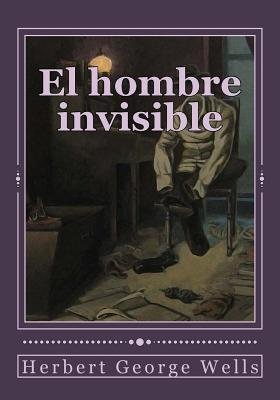Reseña de "El hombre invisible"/ Review of "The Invisible man"

El siglo XIX es conocido por muchos como el siglo de las maravillas y de los descubrimientos, y es que, durante esta época, los avances científicos y tecnológicos moldearían lo que vendría a ser el siglo XX. Pero de la mano con todos estos cambios también venía cierto temor al futuro y los cambios que supondrían dichos avances. Y no me malentiendan, muchas de estas cosas hacen la vida más fácil, pero otras han creado más de un problema a la humanidad.
Dicho esto, la ciencia ficción se ha aprovechado de estos temores de los cambios de paradigmas para formular hipótesis de las consecuencias que supondrían dichos cambios. Así, en el caso de H.G. Wells, encontramos un libro corto e interesante, por demás famoso: “El hombre invisible”.
El caso es que un científico, llamado Griffin, descubre la manera de hacerse invisible. Al principio, este descubrimiento supone para él un avance; sin embargo, al no descubrir la manera de volver a la visibilidad, su conducta comienza a ser errática y paranoica.
La acción comienza en el pueblo de Iping, en Inglaterra. A una posada llega un hombre extraño, cubierto de pies a cabeza, sin dejar ver un rastro de piel. Se encierra varios días en una habitación, sin dejar que nadie entre.
Los días pasan y la gente empieza a tener recelo de lo que está haciendo el hombre, los dueños del lugar, sobre todo la esposa, la señora Hall. Después de un tiempo, al no pagar lo que debía, los dueños entran en la habitación, descubriendo que no hay nadie, sin embargo, el hombre invisible logra escapar, no sin antes haber dejado maltrecho a más de uno.
Así, comienza una persecución que podría catalogarse de absurda, y así lo ve el doctor Kemp, quien no da crédito a la noticia de que un hombre invisible ha causado revuelo por la comarca. Griffin, en su afán de huida, lleva consigo unos libros que, al parecer, contienen el fruto de su trabajo. Se encuentra con un hombre llamado Thomas Marvel, quien hace lo que Griffin le pide, hasta que logra escapar.
El estado de Griffin es tal que se vuelve cínico, y entra en una espiral de locura que lo lleva a cometer acciones inimaginables.
Al toparse con Kemp, y reconocerlo, Griffin le expone cómo logró su descubrimiento, cómo le ha afectado y sus planes, que horrorizan al médico. En cierto sentido, esta obra recuerda un poco a Dr. Jeckill y Mr. Hyde, donde un hombre representa el bien y el mal y su transformación.
La novela ha sido muy bien acogida formando parte del imaginario de la cultura pop. El libro ha sido adaptado en el cine en varias oportunidades, la última en el 2020. También ha formado parte del mundo de los superhéroes, claro está, desde un punto de vista menos cínico.
Con esta novela, G.H. Wells quería confrontar las posibilidades de los avances científicos con los temores a que estos sean usados de mala manera, y aunque la tecnología y los avances científicos han facilitado la vida de millones de personas, no hay que negar también su poder destructivo.
Opinión final
Debo decir que esta novela la leí hace mucho tiempo y me gustó bastante. Sin embargo, hay cosas que cambian con el paso del tiempo, y sentí que al leerla de nuevo, faltaba algo. Tal vez deba ser por el estilo, el contexto o cualquier otra cosa. No obstante, no deja de ser una novela fascinante, y en mi opinión personal, es una buena forma de introducir a los más jóvenes a la literatura, y sobre todo, a la ciencia ficción. Y quién sabe, tal vez el hombre invisible nos acompañe a leerla.

English Version
The 19th century is known by many as the century of wonders and discoveries, and it was during this time that scientific and technological advances would shape what would become the 20th century. But along with all these changes also came a certain fear of the future and the changes that these advances would bring. And don't get me wrong, many of these things make life easier, but others have created more than one problem for mankind.
That said, science fiction has taken advantage of these fears of paradigm shifts to hypothesize the consequences of such changes. Thus, in the case of H.G. Wells, we find a short and interesting book, moreover famous: "The Invisible Man".
The story is about a scientist, named Griffin, who discovers a way to become invisible. At first, this discovery is a breakthrough for him; however, not discovering the way to return to visibility, his behavior begins to be erratic and paranoid.
The action begins in the village of Iping, England. A strange man arrives at a lodge, covered from head to toe, without a trace of skin to be seen. He locks himself in a room for several days, letting no one in.
The days pass and people begin to be suspicious of what the man is doing, the owners of the place, especially the wife, Mrs. Hall. After a while, not paying what he owed, the owners enter the room, discovering that no one is there, however, the invisible man manages to escape, but not before having left more than one of them battered.
Thus begins a chase that could be classified as absurd, and so sees Dr. Kemp, who does not believe the news that an invisible man has caused a stir in the county. Griffin, in his eagerness to flee, carries with him some books that apparently contain the fruits of his labor. He encounters a man named Thomas Marvel, who does Griffin's bidding, until he manages to escape.
Griffin's state is such that he becomes cynical, and he enters a spiral of madness that leads him to commit unimaginable actions.
Upon running into Kemp, and recognizing him, Griffin exposes to him how he achieved his discovery, how it has affected him, and his plans, which horrify the doctor. In a sense, this work is somewhat reminiscent of Dr. Jeckill and Mr. Hyde, where one man represents good and evil and their transformation.
The novel has been very well received as part of the pop culture imagination. The book has been adapted into a movie several times, the last one in 2020. It has also been part of the superhero world, of course, from a less cynical point of view.
With this novel, G.H. Wells wanted to confront the possibilities of scientific advances with the fears of their misuse, and although technology and scientific advances have made life easier for millions of people, there is no denying their destructive power as well.
Final Thoughts
I must say that I read this novel a long time ago and liked it quite a bit. However, there are things that change with the passage of time, and I felt that when I read it again, something was missing. Maybe it must be the style, the context or something else. Nevertheless, it is still a fascinating novel, and in my personal opinion, it is a good way to introduce the younger ones to literature, and especially, to science fiction. And who knows, maybe the invisible man will join us to read it.
Translated with www.DeepL.com/Translator (free version)
Congratulations @edujo! You have completed the following achievement on the Hive blockchain and have been rewarded with new badge(s):
Your next target is to reach 40 posts.
Your next target is to reach 500 upvotes.
You can view your badges on your board and compare yourself to others in the Ranking
If you no longer want to receive notifications, reply to this comment with the word
STOPTo support your work, I also upvoted your post!
I am a fan of H. G. Wells albeit I have not read any of his works. Immediately I saw this post, I checked Project Guitenberg and it turns out the ebook is available for free. I love the story already, haha. Sounds funny too, and logical. I mean, if you mess with things you don't understand you get screwed. I really have to make time to read this book. Thanks for sharing mate.
!discovery 30
I appreciate your comment. It is interesting that the book have some science theory, and generates a debate about the possibility to be invisible. And is a funny book, that's for sure. Enjoy the reading!
This post was shared and voted inside the discord by the curators team of discovery-it
Join our community! hive-193212
Discovery-it is also a Witness, vote for us here
Delegate to us for passive income. Check our 80% fee-back Program
Esta novela es increíble, al argumento, la trama y el desarrollo de la historia es magnífico, pero comparto esa sección de quedarse como esperando un poco más, me paso lo mismo, y posteriormente llegué a pensar que no me logré ubicarme del todo en la época, en ese momento la capacidad de asombrar a las personas era mayor y era muy recurrente dejar cabos sueltos para mantener la intriga, así que posiblemente releyéndolo con esa visión tenga un poco más de sentido, no sé, de momento mantengo l duda @edujo hace un tiempo que no pensaba en este libro y no estaría mal hacer un repaso a ver qué tal.
Gran elección, saludos!
Sí, a veces releer un libro es una nueva lectura. En mi caso, yo digo que, siento que falta algo, pero es porque después de tanto tiempo las perspectivas como lector cambian. En sí, el libro es sólido, y gracias a eso abrió el camino para que la ficción especulativa comenzara a tener más adeptos. Otra cosa que me pareció interesante es el tipo de lenguaje que usa, no es tan complicado cuando empieza a explicar cómo logró hacerse invisible. De verdad disfruté de su relectura, porque me hizo recordar lo maravillado que me sentí la primera vez que lo leí. ¡Gracias por comentar!